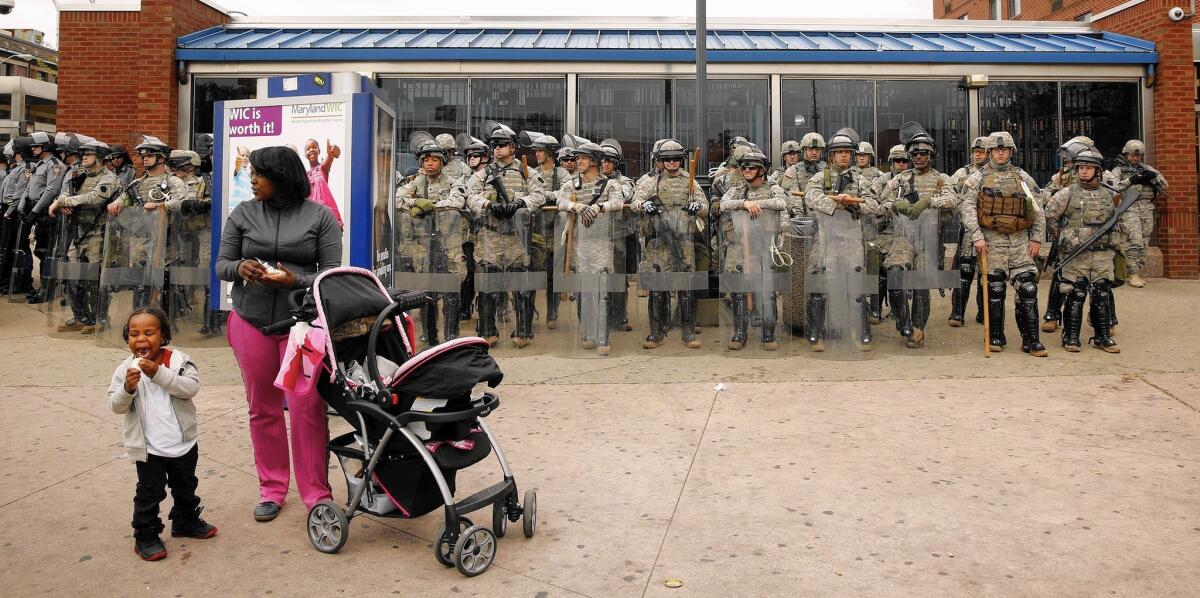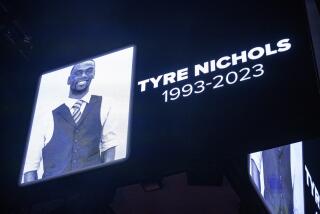Baltimore prosecutor charges six police officers in Freddie Gray’s death

- Share via
Reporting from BALTIMORE — In a remarkably swift response to community demands for action, Baltimore’s prosecutor announced criminal charges Friday against six city police officers who arrested and transported Freddie Gray, a 25-year-old black man who died after being severely injured in police custody.
Declaring Gray’s death a homicide, Baltimore State’s Atty. Marilyn J. Mosby told a crowd of cheering demonstrators that arrest warrants had been issued for five male officers and one female officer. Three of the officers are white, three of them black.
The charges came just a day after Mosby received a police investigative report and just hours after a medical examiner classified Gray’s April 19 death as a homicide.
“I heard your call for no justice, no peace,” Mosby, elected five months ago, told protesters gathered at the marble steps of Baltimore’s War Memorial building.
Charges ranged from “depraved heart” murder — equivalent to second-degree murder — to involuntary manslaughter, assault and misconduct in office. All six officers, who had been suspended with pay, surrendered later Friday.
“Your peace is sincerely needed as I work to bring justice for Freddie Gray,” said Mosby, 35, a former assistant state’s attorney and the daughter and granddaughter of police officers. “To those that are angry or hurt or have their own experience of injustice, I urge you to channel your energy peacefully.”
As demonstrators erupted in shouts of approval, Mosby told them, “No one is above the law.” But she also reassured police officers that the charges “are not an indictment of the entire force.”
The charges capped a volatile 19-day stretch of violence and recriminations that focused attention on long-standing allegations of police brutality against blacks in Baltimore, but also in other American cities after the deaths of several unarmed black men at the hands of white police officers.
Protesters in Baltimore also accused local officials of indifference to police misconduct and festering poverty and neglect in a city with a black mayor, a black police chief and a majority-black City Council and police force. Mosby also is black.
The protests reverberated far beyond Baltimore, drawing President Obama and his new attorney general, Loretta Lynch, into a national debate over police treatment of black citizens, especially in poverty-stricken neighborhoods, such as West Baltimore, where Gray was raised and arrested. The Department of Justice is investigating the case for any civil rights violations.
Some Baltimore lawyers expressed surprise at the speed with which Mosby brought charges, but were divided in their assessment of the strength of her case.
“It’s pretty disconcerting what she is doing, bringing charges after having the case just one day,” said former federal prosecutor Steven H. Levin of Baltimore.
Levin said defense lawyers are likely to seek a change of venue, which could dramatically alter the racial makeup of the jury pool, a crucial factor in a case infused with racial tension. Jury pools in Baltimore are likely to be at least half African American, while in the suburbs they are predominantly white.
Arnold M. Weiner, a prominent Baltimore defense lawyer who has won several high-profile acquittals, said the charges appeared to have been carefully prepared.
“Obviously she has been gathering information as this investigation continued,” he said. “The charges very carefully distinguish among the participants, and she laid out the real scale of culpability here.”
Mosby said Gray’s arrest itself was illegal because the knife tucked into his clothing was a legal pocketknife — not an illegal switchblade, as police had claimed in reports on the April 12 arrest.
Police said Gray was arrested after he made eye contact with an officer and then fled.
Gray died of a spinal injury after he was placed into a police van without a seat belt, in violation of police policy, Mosby said.
“Mr. Gray suffered a critical neck injury as a result of being handcuffed, shackled by his feet and unrestrained inside of the BPD [police] wagon,” the prosecutor said.
An officer checked on Gray at one point and found him unresponsive, but did not call for medical help, Mosby said. After Gray had been driven several blocks, the van stopped and an officer opened the rear door. Gray was lying, unbelted, on the floor of the wagon.
“Mr. Gray at that time said he needed help and indicated that he could not breathe,” Mosby said. He twice asked for a medic, but no help was summoned.
At one juncture during the 44-minute span between Gray’s arrest and his arrival at a precinct station, a call went out for the wagon to pick up another suspect. An officer answered the call, “despite Mr. Gray’s obvious and recognized need for assistance,” Mosby said.
Gray’s death pitted Baltimore’s African American majority against its black-led Police Department. Mayor Stephanie Rawlings-Blake, whose family has long been active in the African American community and electoral politics, was criticized by both protesters and police.
At a two-minute news conference where she took no questions, Rawlings-Blake pledged Friday to “continue to be relentless in changing the culture of the Police Department.”
“To those of you who want to engage in brutality, misconduct, racism and corruption, let me be clear: There is no place for you in the Baltimore City Police Department,” the mayor said.
“There will be justice for Mr. Gray,” she added. “Justice must apply to all of us equally.”
The Baltimore Fraternal Order of Police said the union would stand by the officers. “Our organization has supported these officers and will continue to do so,” union official Lt. Kenneth Butler told reporters.
Michael E. Davey, a police union lawyer, called the charges a rush to judgment.
“I can tell you they are not happy,” Davey said of rank-and-file officers. “This decision to charge officers is going to make our job harder.”
The most serious charge was second-degree “depraved heart” murder, lodged against the driver of the wagon, Officer Caesar R. Goodson Jr.
Sometimes called “depraved indifference,” the charge is less serious than a first-degree intentional killing, but does involve a special degree of reckless indifference. It carries a penalty of 30 years in prison.
Lt. Brian W. Rice was charged with manslaughter, assault, misconduct and false imprisonment. Officer William G. Porter and Sgt. Alicia D. White were charged with manslaughter, assault and misconduct. Officers Edward M. Nero and Garrett E. Miller were charged with assault, misconduct and false imprisonment.
All six of the officers posted bond and were released Friday.
Mosby’s stunning announcement brought a sense of vindication for some activists and city leaders a day before weekend rallies were scheduled in Baltimore, raising fears of renewed violence, at least before the officers were charged.
“There is hope. A prosecuting attorney like that gives me hope,” said Jay Morrison, a community activist with the Young Minds Can Community Coalition.
U.S. Rep. Elijah E. Cummings (D-Md.), a veteran civil rights leader from Baltimore who delivered an impassioned eulogy at Gray’s funeral, said, “The process has started. That’s the main thing.”
Surrounded by clergy and leaders of the city’s African American community, Cummings added: “So many people in the neighborhoods have never seen a victory. They had come to believe the system had not worked, that the system worked against them. It’s a new day in our city.”
But others cautioned there was a long road ahead to resolution of the case.
“This is not justice. This is not the end of the process. This is the beginning,” City Councilman Brandon Scott said in an interview. “This is not justice or injustice. Folks can still be disappointed.”
Larry Johnson, 59, who is affiliated with the Black People’s Library in Baltimore, seemed to speak for many low-income residents when he said city leaders responded only because the violence and city-imposed curfews had cut into the profits of mostly white-run businesses.
“When the young folks started affecting the economic status of the people making money, it got the adults’ attention,” Johnson said.
Before the charges were announced, Gene Ryan, Fraternal Order of Police president, told Mosby in a letter that none of the six officers was responsible for Gray’s death.
“At all times, each of the officers diligently balanced their obligations to protect Mr. Gray and discharge their duties to protect the public,” Ryan wrote.
Ryan asked Mosby to appoint a special prosecutor, contending that she has a conflict of interest. She has received political support from William H. Murphy Jr., the lawyer for Gray’s family, and her husband is a Baltimore city councilman.
Mosby said she would not appoint another prosecutor.
At the White House, Obama said, “It is absolutely vital that the truth comes out on what happened to Freddie Gray.”
He added: “All the evidence needs to be presented. Those individuals who are charged obviously are entitled to due process and rule of law.”
Twitter: @davidzucchino
Twitter: @timphelpsLAT
Times staff writers Michael Muskal in Los Angeles and Joseph Tanfani in Baltimore contributed to this report.
More to Read
Sign up for Essential California
The most important California stories and recommendations in your inbox every morning.
You may occasionally receive promotional content from the Los Angeles Times.












